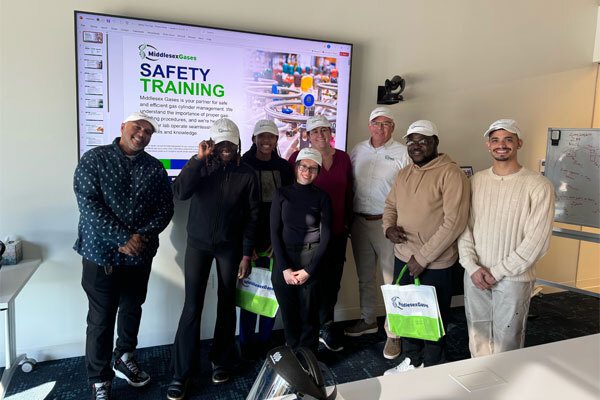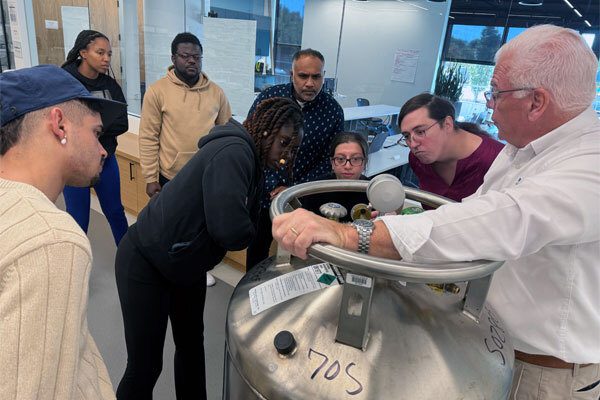Gas Cylinder Training for the Next Generation of Life Science Workers
 Since the inception of the Bioversity Biotech Career Foundations eight-week workforce training program in January 2024, members of the Middlesex Gases team have been helping train and prepare the students for a rewarding and challenging career in the life sciences industry.
Since the inception of the Bioversity Biotech Career Foundations eight-week workforce training program in January 2024, members of the Middlesex Gases team have been helping train and prepare the students for a rewarding and challenging career in the life sciences industry.
The Biotech Career Foundations curriculum focuses on developing the technical and soft skills that learners need to succeed and advance in a life sciences career. These concepts are taught by faculty from the Massachusetts College of Pharmacy and Health Sciences as well as professionals in the life sciences industry, like Middlesex.
With over 75 years of experience manufacturing and distributing specialty, cryogenic, and medical gases, the Middlesex Gases team is responsible for introducing the Bioversity students to critical gas cylinder safety and handling procedures. Often, new hires come into the lab environment with only a surface understanding of the gases they are working with and the associated risks. They are not prepared for everyday tasks they may be expected to do, like maneuvering a heavy and awkward gas-filled dewar or managing common gas cylinder issues, such as a regulator freezing up, a vent that won’t fully close, or a stuck cap.
The Middlesex Gases two-part safety training addresses these important topics and many more. First, in a classroom setting, students are taught how to:
- Safely transport and store gas cylinders.
- Prepare to handle a cylinder, including wearing the proper personal protective equipment.
- Inspect the cylinder and workspace.
- Connect and disconnect the cylinder.
- Understand Occupational Safety and Health Administration (OSHA) standards and avoid the most common OSHA violations.
 Then, for the second half of the safety training, students get out of the classroom and into the lab, where they have the opportunity to put what they’ve learned into practice.
Then, for the second half of the safety training, students get out of the classroom and into the lab, where they have the opportunity to put what they’ve learned into practice.
Each student has the chance to experience the real-life challenges of wheeling a filled liquid nitrogen dewar, weighing about 700 lbs., from one spot in the lab to another. There is also a thorough review of the dewar’s parts and how a dewar works, as well as the signs a dewar might be damaged, leaking, or faulty and the emergency procedures to follow for different scenarios.
Next, the students get hands-on practice detaching, moving, and storing cylinders holding roughly 200 to 300 cubic feet of gas. This experiential learning process includes closing the cylinder valve to shut down the gas flow; removing a regulator or pigtail from the cylinder valve; freeing the cylinder from the wall, lab bench, or other equipment it is attached to; putting it on a cart; and moving it to the empty cylinder storage area.
Throughout the two-part training, the Middlesex instructors field questions from the students, offering insights that even longtime lab employees may not know. Here are a couple of important facts about dewars and gas cylinders that all lab workers should understand:
- Dewars are designed to vent excess gas pressure. If the pressure in a liquid nitrogen dewar builds up to the maximum pressure setting, a safety on top of the dewar opens to release the excess. This venting-off process is often accompanied by a loud hissing or popping noise that can sound like the dewar is about to blow and may send lab personnel into a panic if they don’t understand what is happening. The students are taught that this is a normal occurrence and they shouldn’t be alarmed by it.
- Cylinder valves are made for a specific type of gas. The Compressed Gas Association (CGA) has developed a unique code for each lab gas and a distinct screw thread pattern for the gas cylinder valve and the regulator to be used with that gas. This means that the valve on a gas cylinder for CO2 has a screw thread with a CGA code that matches only with a CO2 regulator that has the same code. While this is an excellent safety precaution, a lab worker who does not realize that a valve and regulator must have the same CGA code to attach to each other can become easily frustrated when the two won’t connect. Even worse, they may attempt to modify the regulator to force fit it on a valve, which can have disastrous consequences. Students equipped with this knowledge can be a huge asset to their lab colleagues from day one.
After completing both phases of the Middlesex Gases safety training, Bioversity students are well versed in proper dewar and gas cylinder safety and handling guidelines as well as the potential hazards that may arise if these protocols are not followed. Together, all the core competencies taught throughout the program help prepare a new generation of life sciences workers for a successful career in this exciting industry.
Of course, it is important for everyone working in a life sciences lab—not just new hires—to prioritize gas safety and be aware of the inherent risks of working with pressurized gases. If you think your lab personnel could use a refresher on safety procedures, please contact the Middlesex team to learn more about our safety audits and training courses.
